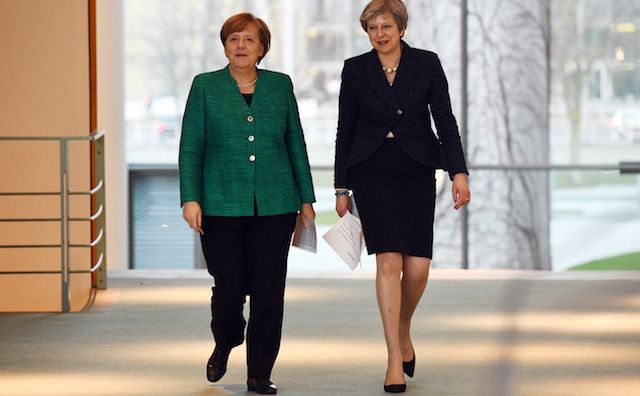Germans expect soft Brexit but want EU to be uncompromising
Warning to London: recent polls reveal that Germans remain committed to the European Union and are concerned about political uncertainty, but they expect Berlin to remain tough on the terms of the UK’s separation.

In a nutshell
- 62% of Germans regret that the UK is leaving the EU, but they are not very concerned about it
- Germans don’t expect a negative impact on their economy
- They also believe that that the EU should not make Brexit too easy for the British, for the sake of principles
Almost two years after the historic referendum in the United Kingdom, what do the citizens of Germany think of Brexit and its consequences?
The British Chamber of Commerce in Germany, KPMG, Open Europe Berlin, and the Official Monetary and Financial Institutions Forum (OMFIF), asked a social research company to conduct a survey on exactly that matter in Germany.
In March 2018, a minority – 39 percent – of the German public said they were very concerned about Brexit. Many more said they were worried about Donald Trump (82 percent); the crises in the Middle East (75 percent); the nuclear situation in North Korea (71 percent); and tensions between Europe and Russia (66 percent).
Around 62 percent of the respondents said they “regret the UK leaving the EU.” That was almost unchanged from the results immediately after the referendum. These misgivings were more pronounced in western parts of Germany (65 percent) than in eastern parts (50 percent). Supporters of the Green party showed the most regret (83 percent). Only the supporters of the euroskeptic Alternative for Germany (AfD) (46 percent) displayed relatively little regret over Brexit.
This was not a sign of massive confidence in the future of the EU as it is today.
If an EU membership referendum were held in Germany, 82 percent would vote “remain” and only 14 percent would vote “leave,” exactly as indicated in June 2016. Again, supporters of the Green party (91 percent remain) were the most pro-EU. Only AfD supporters would favor German departure (73 percent). About 42 percent of Germans believed that other countries may leave the EU, whereas 46 percent did not think so. This was not a sign of massive confidence in the future of the EU as it is today. In particular, the easterners, the less educated, and supporters of the extreme left and right, thought the EU would unravel.
Asked whether the relationship between Germany and the UK had worsened since the Brexit decision, 42 percent said “yes” and 48 percent said “no.” Only 11 percent of Germans expected cooperation between the remaining 27 EU member states to become “easier” after Brexit. Almost half thought there would be little change, and 39 percent even believed cooperation will prove to be “more difficult.”
Strange puritanism
Germans mostly (41 percent) expected “no influence” of Brexit on their own economy. A “rather damaging” effect was expected by 33 percent, and “rather beneficial” consequences by 15 percent of the respondents. About 53 percent said a “soft Brexit” was more likely. This would include the UK remaining close to the customs union and the single market. Only 38 percent expected a “hard Brexit” of near-total separation.
A large majority of Germans (65 percent) wanted the EU to stand firm against Britain during the talks. The share of hardliners was the highest among pro-EU supporters of the Greens (75 percent) and the Social Democrats (71 percent), and the lowest among eastern Germans (46 percent) and AfD supporters (47 percent).
Especially this last finding once more reaffirms a certain “Kantian” attitude of Germans as sticklers for principles dismissing the idea of “cherry-picking” – even in the realm of win-win deals. That is a belief that “Europe has to hurt in order to be good,” and leaving the EU has to hurt even more. This attitude, derided by philosopher and political scientist Lord Ralf Dahrendorf (1929-2009) back in 1979 as some “strange puritanism, not to say masochism,” still has currency not only in EU circles but also in the German population.
Overall, these survey results hardly bring comfort to the UK government: on the German public’s angst priority list, Brexit is at the bottom. The Germans’ concern over its negative consequences for their economy is not pronounced. Also, a clear majority want the EU to be unyielding during the Brexit negotiations – probably expecting the UK to back down from its “red lines,” since most Germans also expect a “soft Brexit” to be the final result.






